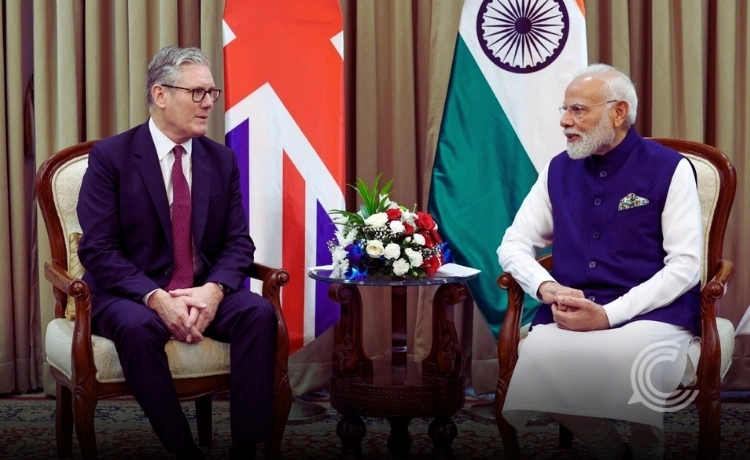Modi Meets Starmer in Mumbai, Strengthens India-UK Trade Tech Ties

Key Highlights:
- India and the UK reaffirm strategic and trade cooperation, signing multiple agreements.
- 64 Indian companies to invest £1.3 billion in the UK, creating nearly 7,000 jobs.
- Education, defence, and technology partnerships set to deepen under India-UK Technology Security Initiative.
India’s Prime Minister Narendra Modi and the UK Prime Minister Keir Starmer met in Mumbai on Thursday, reaffirming the commitment of both nations to strengthen trade, technology, and strategic cooperation. The leaders signed a series of agreements aimed at expanding economic ties, boosting defence collaboration, and enhancing educational partnerships.
Modi and Starmer Seal Stronger Economic Partnership
Speaking at a joint press conference today, October 10, at Raj Bhawan, PM Modi welcomed his UK counterpart, Starmer, on his first official visit to India. “Under Prime Minister Starmer’s leadership, there has been significant progress in India-UK ties,” Modi said, highlighting the landmark India-UK Free Trade Agreement (FTA) signed in July. The FTA, he noted, “paves the way for a new trade chapter” between the two countries, facilitating reduced tariffs and greater market access.
It was a delight to welcome my friend, PM Keir Starmer at the Raj Bhavan in Mumbai. Being his first visit to India, it is surely a special occasion. The presence of the largest business delegation to India makes it even more special and illustrates the strong potential of… pic.twitter.com/znZTxoWq1l
— Narendra Modi (@narendramodi) October 9, 2025
Starmer praised India’s economic growth and emphasized the potential of a modern partnership. “We are building something here, focused on the future, availing opportunities together,” he said, referring to the UK-India Comprehensive Economic and Trade Agreement (CETA). “The Agreement gives our nations the confidence to work even more closely together,” Starmer added, as reported by the BBC.
Investments and Job Creation
A key outcome of the visit is the announcement that 64 Indian companies will invest over £1.3 billion in the UK, creating nearly 7,000 jobs across multiple regions. These investments span sectors including engineering, technology, AI, biotechnology, and sustainable agriculture, according to the UK Prime Minister’s Office.
Furthermore, advanced manufacturing projects are also estimated to benefit from these deals. TVS Motor plans to invest £250 million in Solihull to expand Norton Motorcycles’ operations and develop next-generation electric vehicles, creating 300 high-quality jobs. In addition to this, Engineering firm Cyient will be investing £100 million in semiconductors, clean energy, and digital innovation, adding 300 UK jobs. Agri-tech firm Atul–Date Palm Developments will establish advanced R&D facilities in Somerset, generating 44 skilled jobs.
Also Read | China Tightens Rare Earth Export Curbs Over Military and Chip Tech
“These investments demonstrate the UK’s attractiveness as a global hub for innovation and talent,” Starmer said during the press conference, highlighting how Indian investment bolsters local employment and technological growth, according to Reuters.
Education and Technology Partnerships
The visit also emphasized educational collaboration, with nine UK universities expected to establish campuses in India. Modi confirmed that the GIFT City in Gujarat will host three of these campuses, boosting higher education accessibility and international knowledge exchange.
The UK-India Technology Security Initiative, launched last year, will see 28 of the announced investments focusing on AI, biotechnology, semiconductors, and other emerging technologies. Starmer noted that the initiative strengthens collaboration in critical and high-tech sectors, ensuring both nations remain at the forefront of innovation, as reported by The Times of India.
Defence and Strategic Cooperation
Both leaders reaffirmed the importance of defence and maritime security cooperation in the Indo-Pacific region. Modi called India and the UK “natural partners,” emphasizing that deeper collaboration provides stability amid global uncertainty. The agreements signed are expected to accelerate bilateral trade growth while reinforcing security and technological cooperation.
Starmer also highlighted the broader impact of the visit, stating that India is poised to become a ‘Viksit Bharat’ by 2047, with the UK positioned as a strategic partner in realizing this vision. With India set to become the world’s third-largest economy by 2028, the partnership is likely to expand rapidly, opening avenues for joint ventures, workforce development, and investment.
